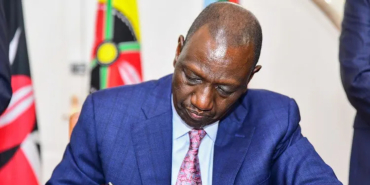IMF Launches a Probe into Kenya’s US Dollar Shortage

The International Monetary Fund (IMF) says it is monitoring challenges in accessing the US dollar in Kenya in a bid to determine the reasons behind the crisis.
IMF said the availability of dollars in the forex interbank market has dried up, forcing banks to seek dollars from clients and resulting in transactions priced at rates higher than the official exchange rate.
“Liquidity in the interbank FX (forex) market has dried up and shifted to the bank-client market where forex transactions are executed at a more depreciated rate. Banks report delays in meeting some client orders, and bilateral transactions between some non-financial corporates,” IMF said in a statement.
“Staff is closely monitoring the situation with a view to determining the main factors behind market distortions.”
IMF said it expects a further decline in Kenya’s foreign-currency reserves next year as high borrowing costs limit access to global credit markets.
“The important buffer to short-term shocks and fending off currency depreciation is still expected to remain adequate,” the IMF said in a statement after approving a $447 million loan to Kenya.
The Central Bank of Kenya (CBK) has linked the dollar shortages to greater FX demands after an increase in global commodity prices, which has bloated the country’s import bill.
To address the challenges of pricing and liquidity, CBK is set to issue new forex trading guidelines to support the smooth, fair and efficient functioning of the foreign exchange market.
“The leading principles include practices on execution, governance and risk management and compliance which foster a robust, fair, open liquid and appropriately transparent market. These measures, supported by mutually consistent monetary, exchange rate and fiscal policies, are essential to maintain competitiveness, revitalize the interbank FX market, protect FX reserves and ensure continued financial stability. Any FX interventions by the CBK will be limited to responding to excessive market volatility,” CBK said.
The Kenya shilling continues to steadily fall against the US dollar this year with the local unit crossing the Sh123 mark against the dollar last week.








Comments
Borrowing money is…
Permalink
Borrowing money is destroying the country.our country is headed to real problems.Debt exposure is becoming massive.The ' sleeping dragon ' will rise up and pick up our resources for cents,when our country starts to default on their loans.
Maybe wash wash gang have…
Permalink
Maybe wash wash gang have moved operations.
Add new comment